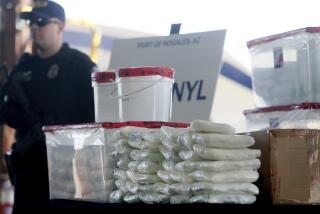U.S. to Urge Joint Research on Global Warming : Environment: The White House is to host an international conference next week. The session will assess economic, scientific studies on climate change.
- Share via
WASHINGTON — The Bush Administration will propose next week an international research program on the greenhouse effect and the threat of global warming.
The proposal will be offered at a White House-sponsored conference April 17 and 18 in Washington, where the economic and scientific research on climate change will be assessed by science, environmental, and finance ministers from 17 countries and the Organization for Economic Cooperation and Development.
President Bush will open and close the session, which will consider not only what is known about the greenhouse effect, but “more importantly what we don’t know, what the uncertainties are, and how we might reduce those uncertainties,” said presidential science adviser D. Allan Bromley.
Critics of the Administration’s response to evidence of global warming have zeroed in on the agenda for next week’s meeting because it will focus on uncertainties rather than addressing response strategies, such as conservation and renewable energy sources.
“The President is using this conference as a leadership facade,” Ruth Caplan, executive director of the Environmental Action Foundation, said Wednesday.
“When he should be leading the international call for action, he is using debate to buy time and delay action. I predict that you will see coming out of this conference dire predictions from the U.S. delegation about the economic dislocations of responding to global warming.”
Since the emergence of the global warming issue as an international policy concern, the Bush Administration has been under pressure from several European countries and environmental activists to take a more aggressive stance toward the abatement of greenhouse gases.
In an obvious reference to those pressures, Bromley told a luncheon at the National Press Club on Wednesday that, while vast uncertainties remain, “The Bush Administration does not and never has believed that further research is any substitute for action.”
The idea for next week’s White House conference emerged in the wake of a meeting sponsored by the Dutch government late last year, where European environmental ministers pushed for a resolution calling for the stabilization of carbon dioxide emissions at 1988 levels by the turn of the century.
Backed by Japan and the Soviet Union, the U.S. delegation to the conference succeeded in changing the objective to stabilization “as soon as possible.”
Bromley said the concept of the White House conference developed because the economic implications of an international effort to slow the production of greenhouse gases had not been considered at the conference in the Netherlands.
In addition to proposing an integrated scientific research program, the U.S. delegation to next week’s conference is expected to offer estimates on the cost of stabilizing production of greenhouse pollutants, chiefly carbon dioxide and methane.
One study has estimated the United States’ potential cost of combatting global warming over the next century at as much as $3.6 trillion, but environmentalists contend that current economic projections are excessively high because they do not take account of the benefits accompanying the reduction of greenhouse gas emissions.
Bromley defended the Administration position, saying it has already made significant strides. He cited U.S. pressure for a ban on chlorofluorocarbons (CFCs), which damage the ozone layer in the stratosphere, and acid rain abatement provisions in the clean air bill.
More to Read
Sign up for Essential California
The most important California stories and recommendations in your inbox every morning.
You may occasionally receive promotional content from the Los Angeles Times.













